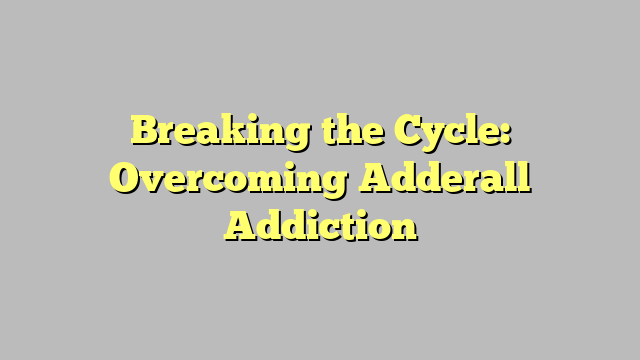
Breaking the Cycle: Overcoming Adderall Addiction
Adderall addiction is a growing concern, especially among individuals who rely on this prescription medication to enhance focus and concentration. While Adderall can be effective in treating conditions like ADHD, its misuse and subsequent addiction have become prevalent issues in today’s society. The allure of increased productivity and alertness can quickly spiral into a dangerous cycle of dependence, impacting both physical and mental health.
Often starting innocently as a study aid or performance enhancer, Adderall addiction can sneak up on individuals and take hold before they realize the extent of their dependence. The initial benefits may seem enticing, but over time, the need for higher doses and the inability to function without the drug can lead to a destructive pattern. Recognizing the signs of Adderall addiction early on is crucial in preventing further consequences and breaking free from the cycle of dependency.
Recognizing the Signs
Adderall addiction can be insidious, often starting with what seems like innocent behavior. Using Adderall without a prescription or in higher doses than prescribed may indicate a developing problem. Friends and family may notice increased irritability, trouble sleeping, and changes in personality in those struggling with Adderall addiction.
Physical signs of Adderall addiction can include rapid weight loss, increased heart rate, and frequent headaches. Those addicted to Adderall may also experience withdrawal symptoms when attempting to stop or cut back on their usage. These symptoms can manifest as fatigue, intense cravings, and difficulty concentrating.
Behavioral changes are common in individuals dealing with Adderall addiction. They may show a lack of interest in activities they once enjoyed, neglect responsibilities, and isolate themselves from loved ones. It’s important to pay attention to these shifts in behavior as they can indicate a growing dependence on the drug.
Seeking Help
If you or a loved one is struggling with Adderall addiction, it is crucial to seek professional help. Overcoming addiction is a challenging journey, but with the right support, recovery is possible. Reach out to a licensed therapist or counselor who specializes in addiction treatment.
Support groups can also be beneficial in providing a sense of community and understanding. Connecting with others who are going through similar struggles can offer valuable insights and encouragement. Consider joining a local or online support group dedicated to helping individuals overcome Adderall addiction.
In some cases, inpatient rehab programs may be necessary for those with severe Adderall addictions. These programs offer a structured environment with 24/7 support to help individuals detox safely and learn coping strategies for long-term sobriety. If you feel overwhelmed or unable to manage your addiction on your own, do not hesitate to seek help from a professional.
Adderall Addiction
Rebuilding a Healthy Lifestyle
Adderall addiction can take a toll on various aspects of one’s life, including physical health, mental well-being, and relationships. To overcome this addiction, it is crucial to focus on rebuilding a healthy lifestyle that supports overall wellness. This entails adopting healthy habits such as regular exercise, nutritious eating, and sufficient rest.
Exercise plays a vital role in the recovery process as it not only helps in improving physical fitness but also aids in boosting mood and reducing stress. Engaging in activities like yoga, running, or biking can provide a natural way to enhance dopamine levels, which may have been disrupted due to Adderall abuse. Setting achievable fitness goals and gradually increasing intensity can further contribute to overall well-being.
Nutrition is another key component of rebuilding a healthy lifestyle post-Adderall addiction. Choosing whole foods like fruits, vegetables, lean proteins, and whole grains can replenish essential nutrients that might have been depleted during the addiction phase. Maintaining a balanced diet helps in stabilizing energy levels, improving focus, and supporting recovery efforts. A well-nourished body is better equipped to cope with cravings and sustain long-term sobriety.








